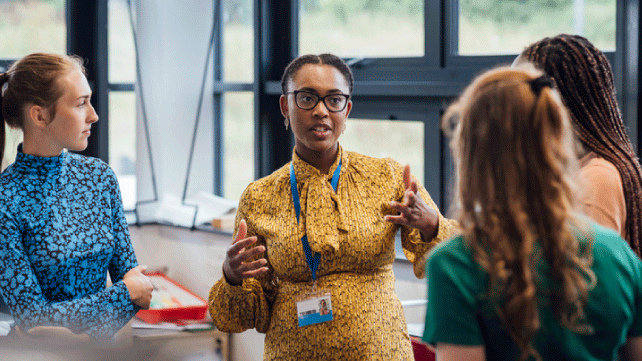Review and reflect – the impact of self-evaluation
Practitioners ensure opportunities for parents and carers to provide feedback about all aspects of the provision and their child’s experience at the setting.

Description of nature of strategy or activity
At Caban Kingsland, self-evaluation has always been the backbone of the setting’s work. Practitioners continually review their practice to ensure that the process remains a current reflection of the service. They consider what has taken place, and share ideas to encourage the well-being, engagement and educational outcomes for all the children in their care. This supports each child’s individual needs and enables the whole team to understand the best possible ways to create a provision that responds to the latest developments in early years education and care.
What impact has this work had on provision and children’s standards?
It's crucial that leaders ensure whole staff ownership of the self-evaluation process. It’s not just a routine that takes up time and effort. It’s a process that allows everyone to reflect on successes and aspects that need to be developed further. At the start, self-evaluation helps practitioners identify the areas that need improvement, which can be stressful as they try to ensure that the provision is doing well.
The process of regularly evaluating does have its own reward. Pin-pointing areas for improvement, introducing changes, reflecting and actioning further improvements reminds practitioners how well they are working. It’s an opportunity to recall the fantastic experiences and the challenges they identified and the changes they introduced and worked hard to embed. In its own way, self-evaluation is the best continual personal development tool available.
Challenges
It’s not easy to work closely with others and then call their practice into question, particularly if they are doing what they have always done. Changes to the curriculum, legislation, additional learning needs, and the impact of COVID-19 identify that, as a team, changes must be continually considered. It’s crucial that leaders include all practitioners in the process, allowing them time to identify their own personal development and professional learning needs. The engagement of all practitioners in the process enables everyone to reflect on areas of best practice. This positively affects the team who feel involved and empowered to shape the provision.
Practitioners ensure opportunities for parents and carers to provide feedback about all aspects of the provision and their child’s experience at the setting. They provide opportunities to receive feedback from other partners and agencies with which they work. This also feeds into opportunities to develop awareness of successful practice and helps identify areas for improvement. Practitioners don’t forget to evidence the positive feedback they receive and take pride in this as they move forward. As things develop in the provision, practitioners add those little changes. It could be as simple as how they respond to something a child said or did. As a reflective tool, it’s the little things that set the standards for inclusive practice and build a better future for the children at the provision.
Paperwork can be challenging at the best of times. The self-evaluation process can be daunting. However, as every day is different and practitioners’ heads can be so full of information, they write down questions; how well are we doing? how do we know? How can we improve? Through analysing their work and moving things to a positive conclusion, they look out for the positive impact on the setting. Self-evaluation will clearly identify the best way forward and remind everyone of the great work they do. They enjoy knowing that everything they do is in the best interests of the children and moving things to a positive conclusion as a team. Then they move on to the next issue.